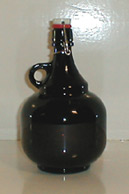I fail to see the relevance of rogue bottles at Costco as they are not bottle conditioned. Pressures during bottle conditioning are undefined and can get high, how high is anyone's guess.
The following explanation is my view of the question by my research, knowledge, and experience. I am NOT a scientist, and this explanation is merely the free exchange of ideas; an open debate. Please proceed at your own risk!
Pressures are NOT undefined and there is a perfect scientific explanation for what goes on during bottle conditioning. It is NOT a guess!
When Rogue sets their growlers out at Costco, the beer warms up. However, as the growler is capped, it remains a closed system. In order to contain the same Volumes of CO2 in the growler at the warmer temperature, the PSI goes up. If the growler held 2.5 volumes CO2 at serving temperature, that pressure at room temp goes up to around 30PSI. Therefore, we can safely assume that the growlers will at least hold 30PSI, since Costco would likely not take the liability of having bottle bombs sitting around their stores (or anyone else that stocks the Rogue growlers at room temp).
During BOTTLE CONDITIONING, you are still dealing with the closed system. The CO2 is produced in the beer and then DIFFUSED into the headspace. It is totally unlike keg force carbonation in which the CO2 is placed at pressure in the headspace and then diffused into the beer. The highest pressure the bottle headspace can hold is the highest pressure the beer GIVES it. Therefore, the highest pressure the headspace of the growler will be subjected to will be the final carbonation pressure (somewhere around 30PSI for 2.5 volumes at 65 degrees).
NOW- some places don't want you to leave your growlers out at room temp, because they are concerned with the pressure. However, some obviously don't care, which is why I used the Rogue example. I'm sure Rogue has enough lawyers working for them that if there was a potential liability from subjecting their growlers to 30PSI, they would change their packaging.
I have yet to find a thread where someone used a standard 64oz growler and it exploded under standard bottle conditioning.
This guy used a standard clear cider jug- not a real growler-
https://www.homebrewtalk.com/f11/exploding-growlers-89246/



